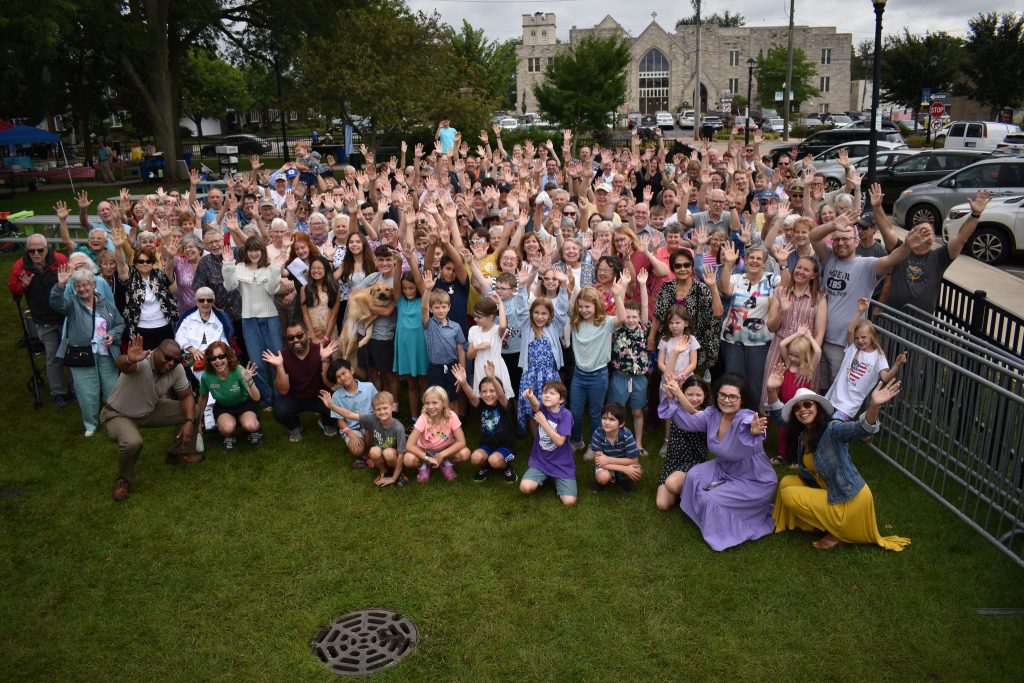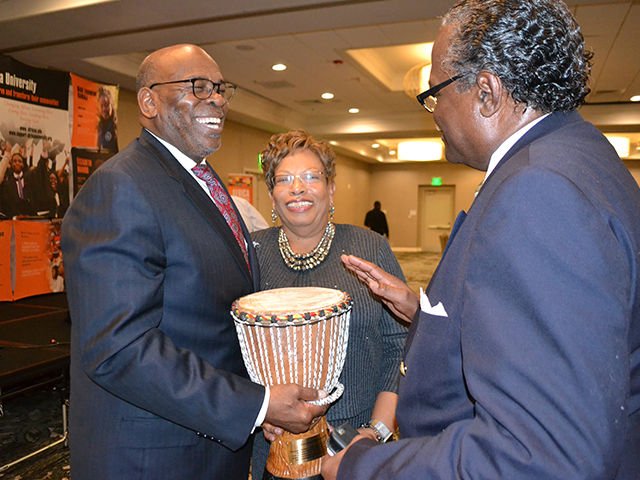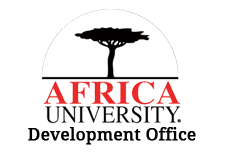E: audevoffice@africau.org | T: 615.340-7438
Priorities
Student Access
Financial hardship is the most common barrier students face in getting a college education. Your gift can help Africa University enroll more students from diverse backgrounds and nurture talent from every corner of the continent. You can help inspire and equip these students to serve and lead.
Invest in making an Africa University education possible for future generations .
The annual cost to an undergraduate student attending Africa University is $7,000. This covers the basics—tuition, housing, meals, medical insurance, student union, registration, laboratory, and technology fees. The international student permit fee is $200.00.
Yet, for many aspiring university students and their families, Africa University’s affordable fees hardly matter. The majority come from African countries where the average income is between .46 cents and $2 a day.
Endowed scholarships are a sustainable response to the endemic financial hardship that results in an inability to pay fees and keeps talented students on the sidelines. The capital you contribute is invested and generates interest income. Africa University uses a portion of that income to provide an annual scholarship award to at least one student. The rest of the income stays in the fund to help it grow.
TO GENERATE ENOUGH SUPPORT FOR ONE STUDENT A YEAR IN PERPETUITY, AN INVESTMENT OF $130,000.00 IS NEEDED.
You may choose to gift that amount at one time or make a pledge and honor it in installment over a number of years. To endow and name a scholarship fund requires an initial, minimum gift of $10,000.
To learn more about endowed scholarships at Africa University, please email Ms. Josefa Bethea Wall, director of planned giving at jbetheawall@africau.org; or Mr. James H. Salley, president/chief executive officer and associate vice chancellor for institutional advancement at jsalley@africau.org; or telephone (615) 340-7438.

Help financially-disadvantaged students to access a life-changing education.
Scholarships are a lifeline for many students at Africa University. They work hard. They are persistent and able. All they lack is the ability to pay.
The annual cost to educate one undergraduate student at Africa University is $7,000.00—which covers tuition, basic meal plan, accommodation, medical care, technology, laboratory, student union and registration fees. International students must also pay the Zimbabwean Immigration Department an additional $200 a year for their study permit, bringing their annual cost to around $7,000.00. Donors may provide either full, or partial, direct scholarships. Give Now!
YOUR GENEROSITY ALLOWS DREAMS TO COME TRUE.
You can support one student for a year by making a gift online or by mailing your check, made out to “Africa University”, to the Africa University Development Office, P. O. Box 340007, Nashville, TN, 37203-0007. For more information about direct scholarships, please call (615) 340-7438 (telephone); or email audevoffice@africau.org.

Supporting Africa University satisfies a need for purpose and solidifies connection to one of the greatest missions of The United Methodist Church. One way this happens is when a church becomes a Keystone Congregation for AU.
A keystone congregation promises to share in the college journey of an AU student with updates, mutual prayers and encouragement; and makes a multi-year commitment to provide annual scholarship support of at least $7,000 for that student. A four-year commitment is ideal. With that, a congregation becomes a permanent part of AU’s strategy for growth and sustainability.
Typically, this level of commitment does not come about overnight. It’s something that congregations grow into, and the journey often starts with members learning more about and appreciating the impact of their witness. A church can choose to do this by hosting a congregation-wide AU Sunday celebration. It’s an exciting, informative event that connects church members with students and staff at Africa University.
AU Sunday events may include guest preachers, speakers and video presentations about Africa University in worship services and Bible study classes, African music, stories from AU students, refreshments, and more. They’re so much fun, congregations make them a fixture on their calendar and look forward to them every year. As interest in AU grows, some congregations move to include a visit to the university to see and experience their impact first-hand.
Since a $7,000 annual commitment can be daunting, it can be broken down like this: Imagine, for example, if 100 members agreed to give $1.35 a week for 52 weeks. That adds up to $5.85 a month and around $70 per person for the year. And it gets the congregation to the goal!
Develop a plan for becoming a Keystone Congregation and extend your church’s missional reach. We want to hear from you. Be in touch by email at audevoffice@africau.org or call us at (615) 340-7438.

Commit to sponsoring one student for four years and build “a beautiful friendship”.
IN THE SHONA LANGUAGE, USAHWIRA MEANS “A BEAUTIFUL FRIENDSHIP”.
A friendship between you or your church and Africa University gives a student the opportunity for an education. An education gives the student an opportunity to change the world.
For $7,000 annually, and a four-year commitment to participate as a Usahwira member, you or your church can help a student to complete their education at Africa University.
Become part of Usahwira (pronounced YOU-suh-we-rah) and build a relationship that makes a real difference in a young person’s life. Establish your Usahwira today.
HOW TO set up an USAHWIRA WITH AFRICA UNIVERSITY:
- Make a four-year commitment to annual scholarship funding and support a student from enrollment to graduation
- Add an annual Africa University Day celebration to the mission calendar of your church.
YOU WILL STRENGTHEN YOUR USAHWIRA WHEN YOU:
- Participate in a Volunteers in Mission (VIM) team or other visit to the campus in Zimbabwe.
- Make a special gift to the endowment fund.
- Identify persons who can make a large gift to the scholarship fund, to a designated special project, and/or make a planned gift
- Enlist five or more honorary alumni/ae association members at the annual level of $50 or a lifetime membership of $500.
FOR MORE INFORMATION, PLEASE CONTACT US AT:
Email: audevoffice@africau.org
Office phone: (615) 340-7438
WEST ASHLEY/SEA ISLANDS SCHOLARSHIP
 I am a second-year student, studying natural resources management. My young sister and my two (younger) brothers are still in high school. Our father is a pastor in North Katanga and our mother is a housewife. My father cannot pay my school fees as in my country, pastors do not have enough salary to pay school fees for their children.
I am a second-year student, studying natural resources management. My young sister and my two (younger) brothers are still in high school. Our father is a pastor in North Katanga and our mother is a housewife. My father cannot pay my school fees as in my country, pastors do not have enough salary to pay school fees for their children.
Studying is very important to me and my family. When I finish my studies, I will be able to help my family and community (society). In my country, agriculture is now important for development and the country is promoting it for a better economy.
MIRIELLE MULUBA KASONGO, DEMOCRATIC REPUBLIC OF CONGO
COLLEGE OF AGRICULTURE, HEALTH AND NATURAL SCIENCES
Student Experience
Students come to Africa University for a first-rate, pan-African education grounded in Christian values. Invest with Africa University in creating an environment where students thrive while realizing their dreams.
Dormitories: The most pressing of those needs is for additional on-campus housing for students.
The university’s peri-urban location offers students the perfect environment in which to focus and flourish. However, that location also makes living off-campus and commuting daily expensive, and challenging. With 1,100 dormitory beds available, only a third of enrolled students have access to on-campus housing. A widening gap between demand and the available supply of campus housing is a major constraint to enrollment growth.
If you would like to invest in student housing at Africa University, consider a gift of $1.5 million to build and equip a dormitory. To explore a potential gift, please contact Mr. James H. Salley, president and chief executive officer, Africa University (Tennessee) Inc., at audevoffice@africau.org or 615.340.7438.

Green Campus Evolution: Climate change and adaptive responses to its impact are imperative for Africa University’s students, faculty and staff. They are working to model resilience and invite you to help accelerate Africa University’s green campus evolution.
In sub-Saharan Africa, where social safety nets are scarce or non-existent, climate events profoundly impact quality of life. For example, late or inadequate rainfall results in crop failure, and ultimately, hunger. Too much rain and crops, homes, livelihoods, and people are lost. For all its unpredictability, climate offers a golden opportunity to tap indigenous knowledge, preserve creation, and innovate.
Creation care initiatives at Africa University already minimize, recycle, and upcycle waste. The growing frequency of climate-related disasters, coupled with financial and sustainability benefits, is fueling Africa University’s transition to green energy sources. With your support, Africa University aims to achieve these goals by 2027:
- 40% of non-energy-intensive university operations powered by solar energy.
- Five (5) water conservation and waste-related projects initiated each year, on and off campus, between 2024-2027.
- One waste recycling start-up launched.
- 30% of student and faculty research focused on environmental sustainability concerns and funded by grants.

Academic Support: By investing in academic development at Africa University, you strengthen our role as an innovation hub and a source of ethical, effective, and engaged leaders for all facets of society.
Expert faculty, first-rate educational technology, and the requisite resources for academic enquiry and learning are crucial to this endeavor. Gifts to the Africa University Endowment Fund can be designated to academic chairs and professorships, teaching/learning resources, and the digital campus.
In sub-Saharan Africa, the demand for seasoned professionals to guide research, innovation and academic development in the higher education sector continues to outpace supply. When competing for expertise, higher education institutions often lose out to the private sector. Gifts of $1 million or more endow an academic chair or professorship and assists Africa University to:
- Recruit and retain diverse faculty members to drive experiential learning and student success.
- Fund research to deliver new knowledge, processes and products that address quality of life disparities and barriers to economic development.
To learn more about the impact of gifts designated to academic development at Africa University, contact Mr. James H. Salley, president and chief executive officer, Africa University (Tennessee) Inc., at audevoffice@africau.org or 615.340.7438.
The Africa University Library Fund supports technology updates and resources acquisition for the Jokomo Yamada Library and other specialized libraries within the institution.
Areas of Greatest Need
Launched in 1988 as one of seven apportioned funds of The United Methodist Church, the Africa University Fund (AUF) undergirds the day-to-day operations of the institution. For example, gifts to the AUF support the work of the Africa University Development Office. They enable retention of outstanding faculty and students, keep the lights on, ensure ongoing maintenance of university infrastructure, etc.
It’s Africa University’s annual fund—unrestricted dollars that can be directed, as a need arises, to priority areas that require urgent action. In 2024, United Methodist churches graciously invested in the AUF at 78.9 percent of the goal. This year, the AUF goal is $1,272,632, apportioned to around 22,000 churches in the United States.
Churches collect their assigned portion through free-will offerings (at the time of the university’s inception this amounted to .29 cents per member per year) and send their gifts to the university through The United Methodist Church’s finance agency, the General Council on Finance and Administration (GCFA).
When you give to the AUF, you equip solution-finders and world changers who address critical challenges and maximize opportunities to be the difference in communities across the continent of Africa and beyond.
Help us close the gap! Encourage your church to make a 100 percent investment in the AUF for 2025.
If you’d like to help, but your congregation is not part of The United Methodist Church structure, you can make a direct annual fund gift. Your gift matters. It can change a life.
 The Honorary Alumni Association is an affordable way to make an annual fund gift to Africa University. Join with an initial membership fee of $50.00, and invest the same amount annually to keep your membership current.
The Honorary Alumni Association is an affordable way to make an annual fund gift to Africa University. Join with an initial membership fee of $50.00, and invest the same amount annually to keep your membership current.
The annual dues of $50.00 may be modest, but when paid by a large number of people, they constitute a substantial resource. Your yearly dues help with immediate, day-to-day needs and play a vital role in helping Africa University to nurture global leaders.
JOIN THE HONORARY ALUMNI ASSOCIATION.
Your membership is needed. It will be appreciated, and it will make a difference. If you are already an honorary alumnus/alumna, and you’ve fallen behind on your dues, give today to renew your membership. Become a lifetime member by investing $500.00 as your initial membership fee.
When we receive your membership dues for the first time, $50.00 or $500.00, and you make a “good faith” commitment to give a similar gift to the Honorary Alumni Association in future years, you will receive a certificate of membership. Thank you for investing in Africa University.
Donor Recognition
Vice Chancellor’s Club
Acacia Level:
Your gift of $100 to $499 generates membership in the Vice Chancellor’s Club at the Acacia level. You will receive a Bronze Lapel Pin, recognizing your central role in the growth of the ministry of Africa University.
Acacia trees are especially numerous on the plains of southern and eastern Africa. Acacias establish deep roots, before growing tall. They are known for their strength and durability which makes them a fitting symbol for Africa University. A flat-top Acacia tree is a central feature of the Africa University logo.
Manica Level:
An investment of $500 to $999 generates membership in the Vice Chancellor’s Club at the Manica Level. You will receive a Gold Lapel Pin and be associated with the Manica (also called Wanyika), one of the clusters of the Shona-speaking people inhabiting eastern Zimbabwe and adjacent areas of Mozambique.
The Manica were enthusiastic participants in the struggle for Zimbabwean independence. National leaders from among the Manica include Herbert Chitepo and the late United Methodist Bishop Abel Muzorewa. Manica-speaking people made up the two kingdoms of Mutasa and Makoni which are said to have existed from the early 17th century.
Chiremba Level:
A gift of $1000 or more generates membership in the Vice Chancellor’s Club at the Chiremba Level. You will receive a Platinum Lapel Pin and take your place alongside dreamers and visionaries in the Africa University story.
Mt. Chiremba rises above the Old Mutare UMC Mission Center across the valley from the Africa University campus. From its peak in the year 1898, Bishop Joseph Crane Hartzell looked down and envisioned hundreds of African young people attending school in the valley below.
British imperialist, Cecil John Rhodes had been granted land rights in that area by Chief Tendai of Manicaland. When Bishop Hartzell shared his vision with him, Rhodes granted to the bishop the old site of the town of Mutare which included 13,000 acres for a Methodist Mission. Today, the Old Mutare Mission Center at the foot of Mt. Chiremba is home to a hospital, high school, primary school, and children’s home. Africa University is built on land from the mission, received as a gift from The United Methodist Church in Zimbabwe in 1988.
 RICHARD E. “DICK” REEVES LEGACY SOCIETY
RICHARD E. “DICK” REEVES LEGACY SOCIETY
Induction into the Richard E. “Dick” Reeves Legacy Society recognizes and thanks those who, by making a planned gift to the university, reached beyond their own lives to build bridges to dreams for future generations of Africa University students. Learn more
 DRUM AWARD
DRUM AWARD
The Drum Award is given to friends of Africa University who have served the institution faithfully and with great effectiveness in raising awareness, making friends and raising funds. It symbolizes a deep appreciation for their continuing to “beat the drum” of education in assisting with the shaping of future leaders for the continent of Africa.
Awardees receive an authentic, hand-carved West African drum.

